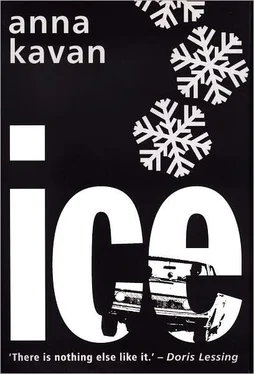I came upon her by chance, not far away, lying face down on the stones. A little blood had trickled out of her mouth. Her neck had an unnatural twist; a living girl could not have turned her head at that angle: the neck was broken. She had been dragged by the hair, hands which had twisted it into a sort of rope had dulled its silvery brightness. On her back blood was still fresh in places, wet and bright red; in other places it had caked black on the white flesh. I looked particularly at one arm, on which the circular marks of teeth stood out clearly. The bones of the forearm were broken, the sharp pointed ends of bone projected at the wrist through the torn tissue. I felt I had been defrauded: I alone should have done the breaking with tender love; I was the only person entitled to inflict wounds. I leaned forward and touched her cold skin.
I went to look in at the cottage window, taking care not to go near enough to be seen from inside. A lot of people were crowded into a small smoky room, firelight flickering red on their faces, reminding me of a medieval picture of hell. At first I could not make out any words; they were all talking at once. I recognized one woman, unusually tall, handsome in a forbidding way; I had seen her at the High House. Now she was with a man she called father who sat just inside the window. Because he was so close to me, his was the first voice I understood. He was relating the legend of the fjord, how every year at the winter solstice a beautiful girl had to be sacrificed to the dragon that lived in its depths. The other voices gradually became silent when he began describing the rite itself. ‘We untie her as soon as we get her up there on the rock. She must struggle a bit, otherwise the dragon might think we’d palmed off a dead girl on him. The water foams down below. The monster’s great scaly coils appear. Then we hurl her down. The whole fjord becomes a maelstrom, blood and foam flying in all directions.’
A lively discussion of the sacrifice followed, different people speaking in turn. They might have been talking about a football match between their team and a rival town. Somebody said: ‘We haven’t so many good-looking girls to spare. Why should we give one of them to the dragon? Why not sacrifice a stranger, some foreign girl who means nothing to any of us?’ The tone of voice suggested that the speaker referred to a special person, whose identity was known to all present. The father started raising objections, but was silenced by his daughter, who called out her agreement, launching into a vicious tirade of which I only caught isolated phrases. ‘Pale girls who look as pure as if they were made of glass … smash them to smithereens…. And I will smash this one….’ The end was shouted. ‘I’ll hurl her down off the rock myself, if none of you have the guts to do it!’
I walked away in disgust. These people were worse than savages. My hands and face were numb, I felt half frozen, and could not think why I had stood there so long listening to their preposterous rigmarole. I had a vague feeling that something was wrong with me, though I could not decide what it was. For a moment this was disturbing; then I forgot it. A small, cold, bright moon shone high in the sky, showed the landscape distinctly. I recognized the fjord but not the scene. Tall perpendicular rocks rose straight out of the water, supporting a flat horizontal rock like a high-diving platform. Some people appeared, dragging the girl between them, her hands tied. As she passed me, I caught a glimpse of her pitiful white face of a child-victim, terrified and betrayed. I sprang forward, tried to reach her, to cut her bonds. Somebody went for me. I threw him off, tried again to get near her, she was dragged away. I rushed after the group, shouting: ‘Murderers!’ Before I could overtake them, they were hauling her up the rock.
I was close to her on the platform high above the fjord. We were alone there, although a mixture of vague sounds behind me indicated the presence of numerous on-lookers. They did not concern me. I was completely concentrated on the trembling figure, half kneeling, half crouching, at the extremity of the rock, overhanging the dark water. Her hair glittered as if with diamond dust under the moon. She was not looking at me, but I could see her face, which was always pale, but now drained of colour right to the bone. I observed her extreme slenderness, felt I could enclose the whole of her with my two hands, even the rib-cage containing her heart. Her skin was like white satin, shadowless in the brilliant moonlight. The circular marks the cords had left on her wrists would have been red in daylight, but now looked black. I could imagine how it would feel to take hold of her wrists and to snap the fragile bones with my hands.
Leaning forward, I touched her cold skin, the shallow hollow in her thigh. Snow had fallen between her breasts.
Armed men came up, pushed me back, seized her by her frail shoulders. Big tears fell from her eyes like icicles, like diamonds, but I was unmoved. They did not seem to me like real tears. She herself did not seem quite real. She was pale and almost transparent, the victim I used for my own enjoyment in dreams. People behind me muttered, impatient at the delay. The men did not wait any longer but hurled her down, her last pathetic scream trailing after her. The night exploded then like a paper bag. Huge jets of water sprang up; waves dashing wildly against the rocks burst in cascades of spray. I hardly noticed the freezing showerbath, but peered over the edge of the platform, and saw a circle of scaly coils emerge from the seething water, in which something white struggled frantically for an instant before the crunch of armour-plated jaws.
I was in a hurry to get back to my lodging. My feet and fingers were numb, my face stiff, my head starting to ache with the cold. As soon as I had thawed out a little in my warm room, I began to write. My main topic, of course, was the Indris, but I still kept up the pretence I had started by writing down anything that seemed of interest about the town. I did not think the security people would bother to read my notes, although they could easily do so while I was out of the room. The childishly simple form of scrambling I used, mixing up sentences about the lemurs with others on local affairs, would at least defeat the woman of the house, who pried into everything.
I derived great satisfaction from describing the gentle mysterious singing creatures, and seemed to grow more deeply involved with them as I wrote. With their enchanting other- world voices, their gay, affectionate, innocent ways, they had become for me symbols of life as it could be on earth, if man’s destructiveness, violence and cruelty were eliminated. I enjoyed writing as a rule, the sentences came to me without effort, as if they formed in my head of their own accord. But now it was quite different, I could not find the right words: I knew I was not expressing myself lucidly, or remembering accurately, and after some minutes put down my pen. Immediately I saw a mental picture of many people crowded into a smoky room, and felt I ought to inform the warden of what I had overheard. At the same time, there was a curious unreality about the memory of that scene, as if I could have dreamt it. And when it occurred to me that the girl might be in real danger I did not quite believe this. I got up, all the same, to go to the telephone. Then, restrained by the peculiar uncertainty as to what was real more than the thought of the woman who would be listening to every word, I decided not to ring up until I got to the café.
My sense of unreality became overwhelming as I left the house. A strong colourless light was making everything outside as clear as day, though I was quite unable to see where it came from. My amazement increased when I observed that this extraordinary light revealed details not normally visible to the naked eye. It was snowing slightly, and the complex structure of each individual snowflake appeared in crystalline clearness, the delicate starlike, flowerlike forms perfectly distinct and as bright as jewels. I looked round for the familiar ruins, but they were no longer there. I was used to the sight of destruction, but this was different. Nothing whatever was left of the ruined town; its structures had disintegrated, the remains were flattened, spread as though a giant steam roller had passed over them. The one or two vertical fragments seemed to have been left intentionally, with the deliberate object of emphasizing the general levelling. With a dreamlike feeling, I walked on, seeing no one, either alive or dead. The air was full of a sweetish smell, not unpleasant, which I could smell on my own hands and clothes, and presumed had been left by some gas. The absence of fires surprised me; nothing seemed to be burning, I saw no smoke. I only now noticed thin trickles of a white milky fluid moving among the debris, collecting in pools here and there. These white pools continually widened as the liquid eroded their edges, eating away whatever came in contact with it; it was only a question of time before the entire mass of wreckage would be disposed of in this way. I stood still for a moment to watch the process, fascinated by such a practical, thorough method of clearance.
Читать дальше












